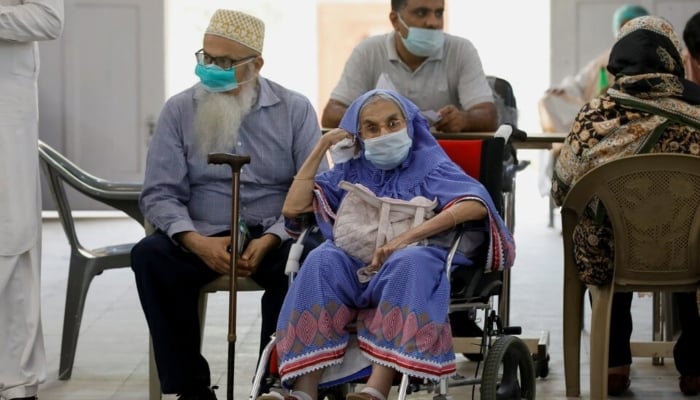Four dead in Karachi as Covid sees 'odd' summer surge
"This year we’re witnessing a midsummer rise, which is not something we usually expect,” says specialist
May 23, 2025

- Covid admissions up at Karachi hospitals, say doctors
- Virus symptoms reappear in midsummer amid JN.1 fears
- Elsewhere in Pakistan, scattered cases have been reported.
At least four people — mostly elderly individuals with compromised immune systems and pre-existing health conditions — have died of Covid-19 in Karachi amid a marked uptick in cases over the past fortnight, officials and infectious disease experts confirmed on Thursday, The News reported.
All the fatalities occurred at Aga Khan University Hospital (AKUH), which has reported a steady rise in Covid-19 admissions — a trend described by experts as “unusual” for this time of year.
Prof Dr Syed Faisal Mahmood, an infectious diseases specialist at AKUH, said the hospital has been seeing a consistent influx of Covid patients. “And we’re seeing patients getting hospitalised daily with Covid-19.”
Describing the current wave as “odd”, Dr Mahmood noted that being a respiratory illness, Covid has typically seen higher transmission in winter months, but this time the cases are rising even as the city is experiencing daytime temperatures exceeding 40°C.
“It’s a flu-like infection, and its spikes are usually seen in winter. However, this year we’re witnessing a midsummer rise, which is not something we usually expect.” Reassuring the public, he said that while the virus is circulating, it is largely causing mild, flu-like symptoms among healthy individuals.
He advised those with symptoms such as sore throat, cough, runny nose and fever to wear a mask, avoid gatherings, and consult a healthcare provider for symptomatic treatment.
“People with high-risk conditions, the elderly and pregnant women should remain cautious. People with high-risk conditions such as those over 65 or with low immunity should get tested so that treatment can be started early.”
Dr Javed Khan, a specialist in respiratory diseases, shared that 8 to 10 patients with symptoms of COVID-19 are arriving daily at a private hospital. “Since last week, 8 to 10 positive cases of COVID-19 are being observed daily,” said Dr Khan.
He further added: “COVID-19 cases are being reported worldwide, and many patients have a travel history.” Dr Khan reassured that the condition of the patients coming to the hospital is improving and there is no cause for concern.
He mentioned the common symptoms of COVID-19: fever, cough, cold, and body aches, adding that many patients also experience difficulty in breathing.
Dr Khan emphasised that citizens should take precautionary measures, including washing their hands thoroughly with soap, and if the severity of fever or cough increases, immediate testing is advised.
8 to 10 patients with COVID-19 symptoms are also coming daily at Dow Hospital, according to hospital authorities.
Other healthcare facilities in the city, including the Sindh Infectious Diseases Hospital (SIDH) at Nipa, also reported receiving Covid patients, though in smaller numbers. Officials at the SIDH said that three patients were currently admitted with Covid, two confirmed via PCR and one via rapid antigen test.
The samples are being forwarded to the Dow University of Health Sciences (DUHS) for further analysis and confirmation. An infectious diseases expert at the DUHS confirmed that Covid cases are re-emerging, particularly among individuals presenting with upper respiratory tract infections and gastrointestinal complaints.
“Symptoms like sore throat, fever, watery eyes, cough, and even stomach upset are being observed. Since this is not typical flu season, Covid-19 is the more likely culprit, and tests are confirming that,” said the expert, cautioning that many people are not getting tested, contributing to under-reporting.
Officials at the DUHS suspect the current infections may be driven by the JN.1 subvariant of Omicron, a strain known to cause milder symptoms but still capable of causing severe illness in vulnerable populations. “We’re going for gene sequencing to determine the exact variant responsible for the infections in Karachi.”
Elsewhere in Pakistan, scattered cases have been reported. While sources at the Shifa International Hospital in Islamabad confirmed the presence of sporadic cases, the district health administration in the capital said that no formal report of a significant rise in Covid cases has been submitted by any hospital.
Officials at the National Institute of Health (NIH) in Islamabad acknowledged receiving informal reports of a surge but said hospitals are not consistently sending samples for laboratory confirmation.
“We’re receiving very few samples, but of those, between 10 to 20 per cent are testing positive. To understand the scale of the issue, we need more data,” said an NIH official, adding that enhanced surveillance is being planned across the country.
Experts are also puzzled by the timing of the increase in Covid and flu-like symptoms. “The rise in respiratory infections during extreme heat is unusual,” said an infectious diseases expert.
“This phenomenon needs close monitoring, particularly because elderly individuals, people with comorbidities such as diabetes, hypertension, cancer, and those on immunosuppressive medications, are more susceptible to complications.”
During the Covid pandemic, Pakistan used a mix of vaccines from Chinese, Russian, European and American manufacturers, including Sinopharm, Sinovac, CanSinoBio, Sputnik V, AstraZeneca, Pfizer-BioNTech and Moderna. The initial vaccine rollout began with frontline workers, followed by the elderly and then the general adult population.
This combination of traditional inactivated virus vaccines and mRNA-based formulations provided a broad immunity shield, which health officials say helped limit the number of Covid deaths in Pakistan to around 30,000 despite multiple waves of the virus and the spread of several variants, including Delta and Omicron.
Sindh Health Minister Dr Azra Pechuho was contacted for comment and sent a questionnaire regarding the current situation, but her office said she was travelling and unavailable to respond before the filing of this report.












